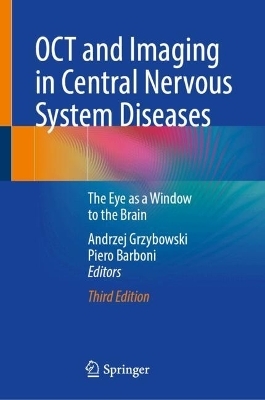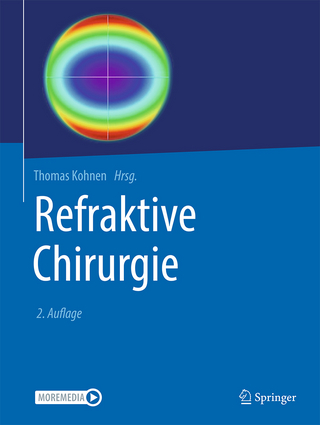
OCT and Imaging in Central Nervous System Diseases
Springer International Publishing (Verlag)
978-3-031-72155-7 (ISBN)
This book offers a current overview of state-of-the-art advances using optical coherence tomography (OCT) re-grading neuronal loss within the retina. Detailed information on the OCT imaging and interpretation is provided for the evaluation of disease progression in numerous neurodegenerative disorders and as a biological marker of neuroaxonal injury. Covering disorders like multiple sclerosis, Parkinson's disease, Alzheimer's disease, intracranial hypertension, Friedreich's ataxia, schizophrenia, hereditary optic neuropathies, glaucoma, and amblyopia, readers will be given insights into effects on the retina and the and optic nerve. Individual chapters are also devoted to OCT technique, new OCT technology in neuro-ophthalmology, OCT and pharmacological treatment, and the use of OCT in animal models.
OCT and Imaging in Central Nervous System Diseases, 3rd Edition is a richly illustrated reference for the diagnosis of many retinal diseases and monitoring of surgical and medical treatment. By documenting the ability of OCT to provide key information on CNS diseases, this book illustrates convincingly that the eye is indeed the "window to the brain".
Andrzej Grzybowski MD, PhD, MBA, is a Professor of Ophthalmology and Chair of the Department of Ophthalmology at the University of Warmia and Mazury, Olsztyn, Poland and the Head of Institute for Research in Ophthalmology, Foundation for Ophthalmology Development, Poznan, Poland.
Professor Grzybowski has been an editor, editor-in-chief, and author of more than 500 peer-reviewed international publications (total IF higher than 1000), and over 50 book's chapters and reviewer for more than 20 journals. He is a member of editorial boards of American Journal of Ophthalmology, Acta Ophthalmologica, PLOS One, Graefe's Archive for Clinical and Experimental Ophthalmology, Translational Vision Science and Technology (TVST), BMC Ophthalmology, Clinics in Dermatology, Journal of Clinical Medicine, Frontiers in Neurology, Asia Pacific Academy of Ophthalmology Journal, and editor in chief of Archives of History and Philosophy of Medicine and Historia Ophthalmologica Internationalis.
He was included in TOP 2% ranking of world-best scientists prepared by Stanford University for 2019, and according to Expertscape, he was ranked No 1 in cataract field worldwide and No 4 in cataract extraction field worldwide. He has authored and conducted the largest European diabetic retinopathy screening project based on artificial intelligence aimed to test 40,000 diabetic patients sponsored by EU funds. He collaborates in AI projects with leading European, US, and Asian scientific teams.
Piero Barboni, MD, graduated in Medicine and Surgery from the University of Bologna, Italy, in 1986 and went on to complete his Specialization in Ophthalmology at the same university in 1990. After spending almost two decades in private practice, he was appointed Professor of Neuro-ophthalmology in the Department of Neurological Science, Bologna University. Since 2012 Dr. Barboni has been a Consultant Ophthalmologist at the Scientific Institute San Raffaele, University of Milan. His memberships include the Association for Research in Vision and Ophthalmology (ARVO) and the North American Neuro-Ophthalmology Society (NANOS). Dr. Barboni has been sub-investigator in many clinical trials on good clinical practice in multiple sclerosis and is a participant in an international research project on Leber's hereditary optic neuropathy. He is the author of more than 70 articles in peer-reviewed journals.1. Retina Imaging - Past and Present.- 2. OCT Technique - Past, Present and Future.- 3. Optical Coherence Tomography and Optic Nerve Edema.- 4. OCT and Compressive Optic Neuropathy.- 5. Optical Coherence Tomography (OCT) and Multiple Sclerosis (MS).- 6. OCT and Parkinson's Disease.- 7. Optical Coherence Tomography in Alzheimer's Disease.- 8. Friedreich's Ataxia and More: Optical Coherence Tomography Findings in Rare Neurological Syndromes.- 9. Other Neurological Disorders: Migraine, Neurosarcoidosis, Schizophrenia, Obstructive Sleep Apnea-Hypopnea Syndrome (OSAHS).- 10. Hereditary Optic Neuropathies.- 11. Trans Neuronal Retrograde Degeneration to OCT in Central Nervous System Diseases.- 12. OCT in Toxic and Nutritional Optic Neuropathies.- 13. Animal Models in Neuro Ophthalmology.
| Erscheinungsdatum | 04.05.2025 |
|---|---|
| Zusatzinfo | VII, 742 p. 222 illus., 204 illus. in color. |
| Verlagsort | Cham |
| Sprache | englisch |
| Maße | 155 x 235 mm |
| Themenwelt | Medizin / Pharmazie ► Medizinische Fachgebiete ► Augenheilkunde |
| Medizin / Pharmazie ► Medizinische Fachgebiete ► Neurologie | |
| Medizin / Pharmazie ► Medizinische Fachgebiete ► Radiologie / Bildgebende Verfahren | |
| Schlagworte | Imaging • neurodegenerative diseases • neuro-ophthalmology • Optical Coherence Topography • Optic Neuropathy • Retinal Nerve Fiber Layer |
| ISBN-10 | 3-031-72155-1 / 3031721551 |
| ISBN-13 | 978-3-031-72155-7 / 9783031721557 |
| Zustand | Neuware |
| Informationen gemäß Produktsicherheitsverordnung (GPSR) | |
| Haben Sie eine Frage zum Produkt? |
aus dem Bereich


